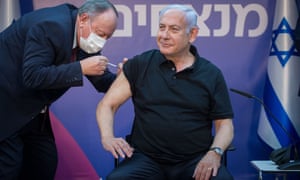
Israel’s coronavirus vaccination campaign, the world’s fastest per capita, has today shifted to booster shots in a bid to protect the most vulnerable citizens by next month and ease curbs on the economy. The country’s lighting-fast vaccine campaign had been expected to slow down this week as the first batches of Pfizer/BioNTech doses ran low.
However, on Saturday night, prime minister Benjamin Netanyahu said he had secured a commitment from the pharmaceutical company to bring forward deliveries in return for Israel providing “statistical data” – effectively making the country a mass test case to see how vaccines might halt the pandemic.
Israelis over the age of 60, those with health problems and medical personnel have been receiving first injections of Pfizer’s vaccines since 19 December. As three weeks have passed, they are now beginning to be due for follow-up, final doses, Reuters reports.
“It changes everything,” said Guy Choshen, a director of the Covid-19 ward at Tel Aviv’s Ichilov Hospital, who got his second injection. “I’m really happy that I’m over that [and] looking forward for all this epidemic to be finished.”
The health ministry said 19.5% of the population have been vaccinated, including more than 72% of the over-60s. Latecomer elderly will be admitted for first shots, officials say, but otherwise vaccines will be reserved for boosters.
Israel’s vaccination rate is by far the fastest compared to the rest of the world, according to the Our World in Data website, which is run by research organisation Oxford Martin School.
One in five Israelis have been given first doses of coronavirus vaccines, roughly ten times higher than the UK and US, with the country aiming to have inoculated all eligible age groups within two months.
In second place is the United Arab Emirates, which as of Sunday had inoculated 10% of its population, followed by Bahrain and the US at 5% and 2%, respectively.
Netanyahu has said vaccinating vulnerable cohorts will allow Israel to emerge from the pandemic in February. Yet while speeding ahead with vaccinations, Israel is currently in lockdown as it suffers a dangerous rise in infections. The health ministry is reporting around 8,000 new cases per day, with record numbers in critical conditions.
“We will be the first country in the world to emerge from the coronavirus,” Netanyahu said. “The agreement that I have made with Pfizer will enable us to vaccinate all citizens of Israel over the age of 16 by the end of March and perhaps even earlier,” he added. Later, while receiving his second dose of the vaccine on Saturday, Netanyahu said the country could do it within two months.
“As part of the agreement with Pfizer, we decided that Israel will be a global model state for the rapid vaccination of an entire country,” he said, adding that Israel will share data with the world that will “help develop strategies for defeating the coronavirus”. Pfizer did not independently confirm the deal.
More than 1.8m Israelis – around 20% of the 9m population – have received their first jab, with initial doses focused on over-60s, healthcare workers, carers and high-risk people. With more shipments arriving on Sunday, it is expected that teachers and younger age groups will be given access in the coming days.
As well as being a small country by size and population, Israel’s vaccine success has been attributed to its highly-digitalised healthcare system and a strong public awareness campaign. An election set for 23 March has also given Netanyahu a massive incentive to get the country back to some form of normality quickly.
However, officials say public over-confidence in the vaccines may have led to laxity in other precautions and stoked fresh contagions. Hospitals worry about being overwhelmed by patients and personnel being more exposed.
“We have quite a rise in the numbers of medical staff which are infected in the last 10 days – an extreme increase – and we are afraid that we’ll be short of people,” Chosen said.
The country is also facing criticism for not offering vaccines to millions of Palestinians living under its occupation. Last week, Amnesty International, said the disparity was an “illustration of how Israeli lives are valued above Palestinian ones”.
Israel says the West Bank-based Palestinian Authority, which has limited self-rule and is seeking vaccines independently, and the militant group Hamas, which rules in Gaza, are responsible for their populations.



